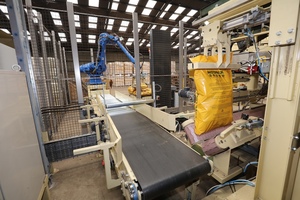

|
Edward Lowton
Editor |


|
| Home> | Handling and Storing | >Pallets and ancillaries | >PACE awarded third Bedmax project |
PACE awarded third Bedmax project
01 May 2024
PACE developed a sophisticated end-of-line solution to help dust-free horse bedding manufacturer Bedmax pack its products

ONE OF the UK's leading designers and manufacturers of automated and robotic packing and palletising solutions recently received its third six-figure order from an innovative manufacturer of environmentally sound equestrian products.
PACE Mechanical Handling will follow up on its two previous projects for Bedmax in 2024 when it starts installing a state-of-the-art packing line at the company's Newark factory.
Bedmax, which makes dust-free horse bedding from pine wood shavings, will use PACE's machinery to pack Hotmax dust-wood logs, a by-product of the manufacturing process.
Making use of everything
One of the unique features of Bedmax is that the bedding is dust-free, which appeals to professional horse trainers. As a business that seeks to use everything that enters its factory, Bedmax's production team realised they could use the dust extracted from the pine shaving to form fuel logs.
The extracted dust is pre-dried, allowing it to be extruded under pressure into densely compacted wood heat logs bound together by the natural lignin inherent in the wood.
PACE's end-of-line solution comprises an automatic sack presenter, complete bag control (CBC) and robotic stack and wrap, which will work with Hotmax's three types of packaging: 10 and 20kg bales in weatherproof material and 10kg paper sacks.
Building on a track record of success
PACE received the order for the Newark site after successfully installing similar lines at Bedmax's factories in Northumberland and Andover.
"The end-of-line solution that we have developed for Bedmax is one of our most sophisticated yet," said Nick Cesare, MD of PACE. "We have developed a new way of receiving the logs and have modified how the bag clamp works so that it can heat seal the plastic bags with their gusset-out style and stitch the paper packs, which are gusset-in. We have learned a lot from installing the first two lines and will be making further enhancements to the third line, and once that has proven itself, we will retrofit the changes to the first two lines."
Before working with PACE, Bedmax relied on old and inefficient coal-packing machinery at all three sites.
"We have an ethos of continuous improvement and refinement," stated Bedmax's founder and MD Tim Smalley. "We are always trying to improve the worst part of our process, and at the moment at Newark, that is how we pack our products. It is labour-intensive and difficult work. At our other sites, PACE's end-of-line solution runs 24/7 and is reliable, accurate and easy to service and maintain. We want to have the same peace of mind at Newark."
Reducing footprint
As well as being more efficient, each of the £150,000 lines have a smaller footprint than the coal packing machines they replace, making the factory tidier and easier to work in.
Production of Bedmax began in 2000 at Greymare in a purpose-built plant. Hotmax fuel logs were launched in 2008, by which time the company was exporting its bedding to France, Germany, the Netherlands and the Czech Republic and was chosen as the official choice of bedding at the Badminton Horse Trails. Today, the company has a turnover of over £17m and employs 60 people across its three sites.
For more information:
Tel: 01775 630 900
- Kickstart for Manchester SMEs
- Onsite markings made easy with mobile thermal-transfer printer
- Nuclear fusion facility under construction
- Glenair AquaMouse connectors available via Powell Electronics
- How remote-access and monitoring tools can increase resilience
- AMRs: the safe choice for the warehouse
- Welcome
- BPMA announces online Pump Engineering Forum
- Tech start-up to half the cost of CNC Machined Parts
- Maintenance manager’s role subject to change


















